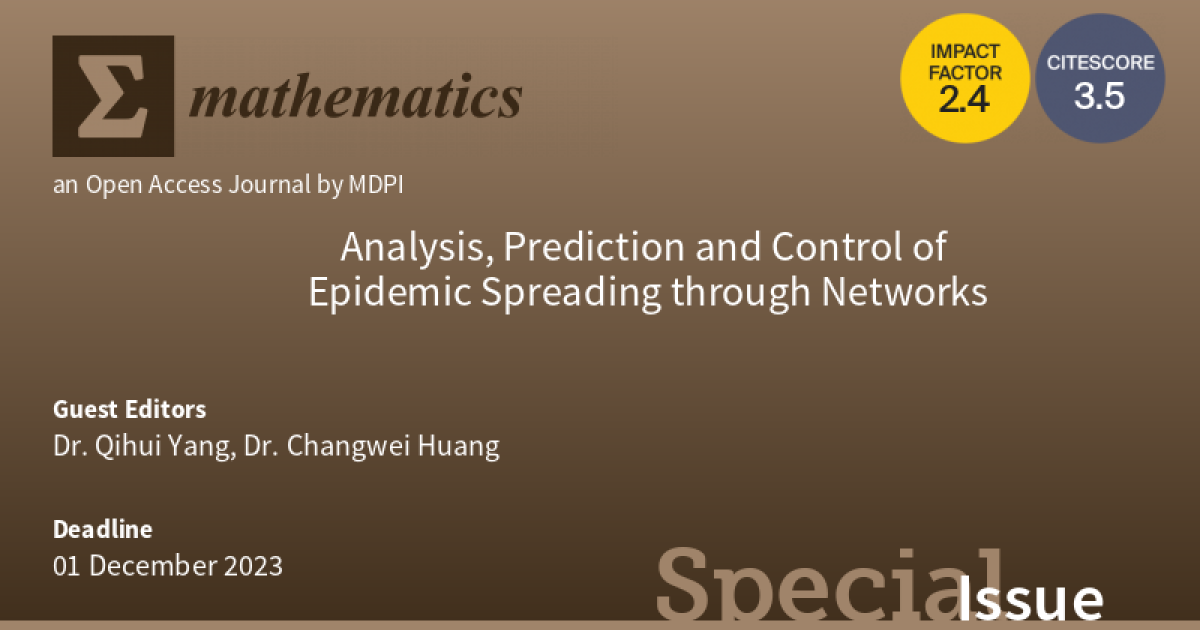Analysis, Prediction and Control of Epidemic Spreading through Networks
A special issue of Mathematics (ISSN 2227-7390). This special issue belongs to the section "Dynamical Systems".
Deadline for manuscript submissions: closed (1 December 2023) | Viewed by 325

Special Issue Editors
Interests: epidemic modeling; network science
Special Issues, Collections and Topics in MDPI journals
Interests: evolutionary game theory; complex networks; complex systems; opinion dynamics; social behavior; social networks; nonlinear dynamics
Special Issues, Collections and Topics in MDPI journals
Special Issue Information
Dear Colleagues,
The pandemic of severe acute respiratory syndrome coronavirus 2 has led to many lives lost and unprecedented restrictions on daily lives around the world. Interdisciplinary communities of scientists have been making enormous efforts to develop epidemic models to control public health crises. Contact networks representing individuals as nodes and social interactions as links are useful tools for studying epidemic spread. Despite recent advances, however, the pandemic has revealed that challenges exist regarding the accuracy of the current predictive tools and their practical role in epidemic control. For example, economic, human behavioral, and social factors can be infused into current epidemic models to better support public health decision making. Machine learning approaches can be leveraged to improve epidemic predictions from limited data. The goal of this Special Issue is thus to seek original works and review papers focusing on epidemic spread. We hope for a broad range of topics to be covered, across theory, methodology, and application of empirical data to epidemic prediction and control.
Topics of interest include but are not limited to the following areas:
- Network epidemic models;
- Epidemic prediction and control;
- Interplay between human behavior factors and epidemic dynamics;
- Artificial intelligence and machine learning approaches;
- Complex systems;
- Nonlinear dynamics;
- Network science;
- Evolutionary games.
Dr. Qihui Yang
Dr. Changwei Huang
Guest Editors
Manuscript Submission Information
Manuscripts should be submitted online at www.mdpi.com by registering and logging in to this website. Once you are registered, click here to go to the submission form. Manuscripts can be submitted until the deadline. All submissions that pass pre-check are peer-reviewed. Accepted papers will be published continuously in the journal (as soon as accepted) and will be listed together on the special issue website. Research articles, review articles as well as short communications are invited. For planned papers, a title and short abstract (about 100 words) can be sent to the Editorial Office for announcement on this website.
Submitted manuscripts should not have been published previously, nor be under consideration for publication elsewhere (except conference proceedings papers). All manuscripts are thoroughly refereed through a single-blind peer-review process. A guide for authors and other relevant information for submission of manuscripts is available on the Instructions for Authors page. Mathematics is an international peer-reviewed open access semimonthly journal published by MDPI.
Please visit the Instructions for Authors page before submitting a manuscript. The Article Processing Charge (APC) for publication in this open access journal is 2600 CHF (Swiss Francs). Submitted papers should be well formatted and use good English. Authors may use MDPI's English editing service prior to publication or during author revisions.
Benefits of Publishing in a Special Issue
- Ease of navigation: Grouping papers by topic helps scholars navigate broad scope journals more efficiently.
- Greater discoverability: Special Issues support the reach and impact of scientific research. Articles in Special Issues are more discoverable and cited more frequently.
- Expansion of research network: Special Issues facilitate connections among authors, fostering scientific collaborations.
- External promotion: Articles in Special Issues are often promoted through the journal's social media, increasing their visibility.
- e-Book format: Special Issues with more than 10 articles can be published as dedicated e-books, ensuring wide and rapid dissemination.
Further information on MDPI's Special Issue polices can be found here.





